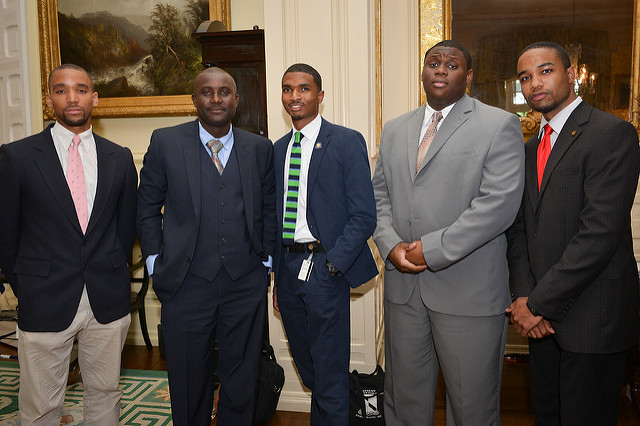HBCU Insights: A social justice toolkit for university administrators
A column by Dr. Larry Walker
Throughout their history historically Black colleges and universities (HBCUs) have been incubators for social change. Alumni, faculty and students including John Lewis and Rosa Parks left an indomitable footprint, which continues to inspire political leaders and activists. During the Civil Rights Movement students from North Carolina A & T, Shaw University and other HBCUs took stances on important issues to fight economic, political and social disparities. While students at HBCUs rallied to change conditions in the United States students at predominantly White institutions (PWIs) also fought against racial and gender discrimination during turbulent times. Unfortunately, incidents including the deaths of students from South Carolina State University, Jackson State and Kent State University represent a cautionary tale for college administrators.
Each tragic event highlights the delicate balance between individual rights, social activism and government intervention. The Neo-Civil Rights Movement spurned by issues including #BlackLivesMatter, immigrant, transgender and women’s rights are reshaping the political landscape. HBCU administrators have to be prepared to address a variety of issues without alienating subgroups. Maintaining a collegial environment that respects the rights of faculty and students to organize and protest is paramount. Members of the university community may support a platform, which is inconsistent with the institution’s policies. Determining how to handle socially delicate topics during politically challenging times is difficult yet some HBCUs have succeeded.
Over the last few months HBCUs including Coppin State University, Harris-Stowe University and Morgan State University stood steadfast despite the events following the deaths of Michael Brown and Freddie Gray. For example, Harris-Stowe facilitated a dialogue among faculty and students, Coppin State helped to clean up West Baltimore and Morgan State University recently convened a task force “Gray Days, Better Tomorrow” to address systemic issues in Baltimore. In each case administrators heeded the call to help transform communities with limited political capital.
Although some HBCUs have taken steps to eliminate economic and social inequities administrators have to continue to work closely with faculty members, students and alumni committed to important causes. Adopting proactive policies that are community centered can mediate philosophical differences between student and administrative leaders. To prevent short and long term problems post-secondary institutions should consider the following:
- Cultivating relations with student leaders- Ensuring administrators, faculty and students have an open line of communication is critical. School administrators have to take time to seek out campus leaders before an on or off campus event negatively impacts the campus community. Students recognize when school leaders are ignoring their concerns. Hosting campus wide meetings that allow individuals to discuss pertinent issues creates a sense of trust.
- Utilizing social media- Recently students at Howard University took steps via social media to address systemic issues including financial aid, school infrastructure and customer service. #TakeBackHU was a trending topic on Twitter and led Howard University President Frederick to address concerns from students. Dr. Frederick assured members of the Howard community that he was committed to addressing issues, which began before his appointment. The efforts by campus leaders to fight for change highlight the power of social media. Topics on Facebook, Periscope, etc. can generate discussion that shapes local, national and international concerns. HBCU administrators including Dr. Walter Kimbrough, (the Hip Hop) President of Dillard University has an active presence on Twitter and communicates with alumni, faculty and students. Dr. Kimbrough embraces social media during a time when more administrators recognize its importance. It is critical that HBCU presidents follow Dr. Kimbrough’s example and continue to communicate with the campus community to avert issues that could disrupt learning.
- Maintaining an active presence on campus- HBCU presidents have to take time to interact with alumni, faculty, staff and students. Developing strong relationships can build social capital, which administrators can use at critical junctures. Meeting with members of the campus community during homecoming, graduation and other events is not enough. Students, faculty and national leaders respect administrators including Dr. William Harvey, President of Hampton University, because of his ability to build coalitions. Throughout his tenure Dr. Harvey has worked collaboratively with faculty to increase funding for research, lower student attrition rates and work with the local community. Administrators should use Dr. Harvey as a template to ensure they develop relationships that can survive turbulent times.
- Recognize emerging trends- Administrators including former Xavier President Dr. Norman Francis recognized that there was a need for more African-American doctors. Currently, Xavier leads the nation in producing African-Americans students that are admitted and graduate from Medical School. The statistic is noteworthy because Xavier does not have a large endowment or educate students from predominantly affluent families. School leaders have to anticipate how national and international issues will impact the campus community. Students may support efforts including #BlackLivesMatter which seek to address police misconduct. Taking a proactive approach could prevent problems between students and administrators from engulfing the campus community.
HBCU administrators have to work with the local community, faculty and student leaders to create a healthy environment that supports efforts to address economic, political and social issues. Ensuring university leaders are active on social media would allow students to interact with officials in real time. The events at Howard University highlight the importance of communicating with students to address legitimate concerns. Cultivating relationships with students can prevent important social issues from negatively affecting the campus community.
Read all of our posts about HBCUs by clicking here.
_____________
Dr. Larry J. Walker is an educational consultant focused on supporting historically Black colleges and universities (HBCUs). His research examines the impact environmental factors have on the academic performance and social emotional functioning of students from HBCUs.





